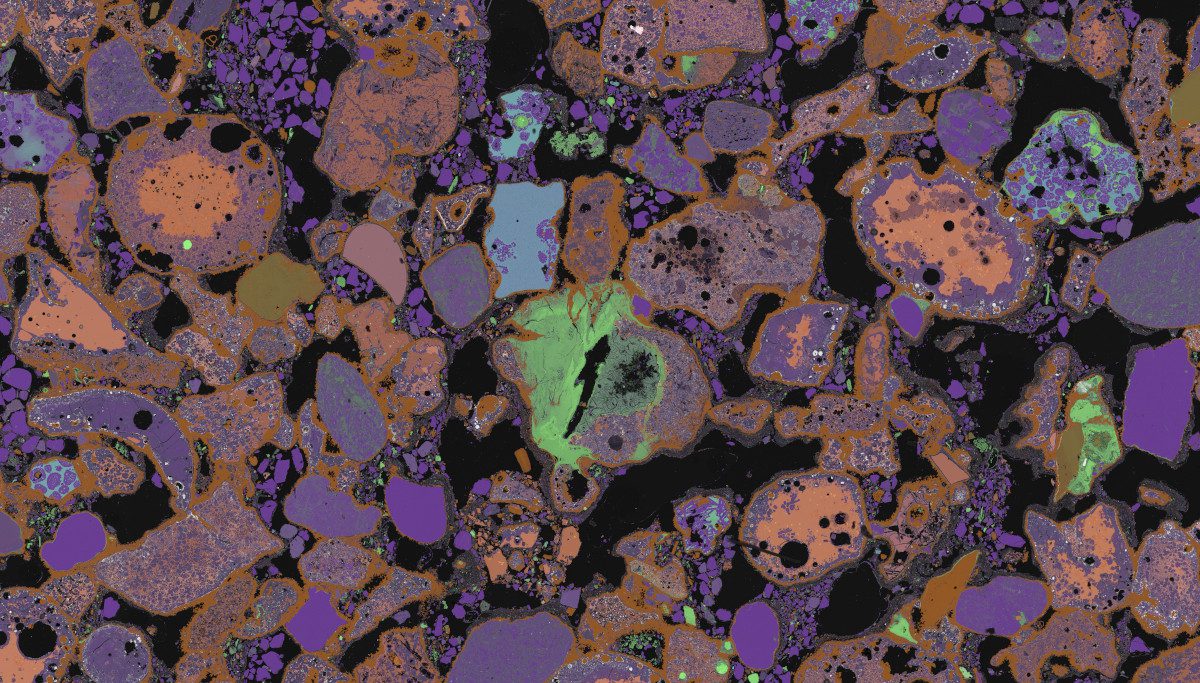An aluminium tab from a drinks can found encased in a new form of rock on the Cumbrian coastline has helped provide scientists with a shocking insight into the impact of human activity on the Earth’s natural processes and materials.
Researchers from the University of Glasgow have found that slag, an industrial waste product produced by the steel industry, is turning into solid rock in as little as 35 years.
The finding challenges centuries of understanding of the planet’s geological processes, where research has shown that rock forms naturally over millions of years.
The researchers have documented for the first time a new ‘rapid anthropoclastic rock cycle’, which mimics natural rock cycles but involves human material over accelerated timescales. They believe the cycle is likely to be underway at similar industrial sites around the globe.
The team warn that the rapid and unplanned-for development of rock around industrial waste sites could have negative impacts on ecosystems and biodiversity, as well as coastal management and land planning.
In a paper published in the journal Geology, the researchers explain how detailed analysis of a two-kilometre stretch of slag deposit, at Derwent Howe in West Cumbria led to their discovery of a new Earth system cycle.
Derwent Howe was home to iron and steel-making foundries during the 19th and 20th centuries, and its coast accumulated 27 million cubic metres of furnace slag over the course of its industrial history.
The slag deposits have formed cliffs of waste material which are being eroded by coastal waves and tides. The team noticed intriguing irregular formations in the cliffs, and began to make detailed observations at 13 sites across the foreshore.
Lab tests using electron microscopy, X-ray diffraction, and Raman spectroscopy helped them to determine that Derwent Howe’s slag materials contain deposits of calcium, iron, and magnesium, and manganese. These elements are highly chemically reactive, which is key to causing the accelerated process of rock formation.
When the slag is eroded by the sea, it exposes the material to seawater and air, which interacts with the slag’s reactive elements to create natural cements including calcite, goethite, and brucite. These cements are the same materials that bind together natural sedimentary rocks, but the chemical reactions cause the process to happen much faster than we have assumed for similar material in a natural rock cycle.
Dr Amanda Owen of the University of Glasgow’s School of Geographical and Earth Sciences is the paper’s corresponding author. Dr Owen said: “For a couple of hundred years, we’ve understood the rock cycle as a natural process that takes thousands to millions of years.
“What’s remarkable here is that we’ve found these human-made materials being incorporated into natural systems and becoming lithified – essentially turning into rock – over the course of decades instead. It challenges our understanding of how a rock is formed, and suggests that the waste material we’ve produced in creating the modern world is going to have an irreversible impact on our future.”

The team’s laboratory analysis was bolstered by the surprising uncovering of modern materials trapped within some of their samples, which helped them deduce how long the lithification of the slag had taken.
“We were able to date this process with remarkable precision,” said Dr John MacDonald, a co-author of the study. “We found both a King George V coin from 1934 and an aluminium can tab with a design that we realised couldn’t have been manufactured before 1989 embedded in the material.
“This gives us a maximum timeframe of 35 years for this rock formation, well within the course of a single human lifetime. This is an example in microcosm of how all the activity we’re undertaking at the Earth’s surface will eventually end up in the geological record as rock, but this process is happening with remarkable, unprecedented speed.”
Dr David Brown, the paper’s third co-author, said: “Slag contains all the elements it needs to turn into rock when it is exposed to seawater and air, so I think it’s very likely that this same phenomenon is happening at any similar slag deposit along a relatively exposed coastline with some wave action anywhere in the world.
“Steel slag waste is a global phenomenon, and as we’ve documented, when alkaline mine wastes are exposed to water and air, there is potential for cementation of loose material.”
The findings represent the first fully documented and dated example of the complete rapid anthropoclastic rock cycle occurring on land. In the paper, the team note that a similar process had previously been observed in the Gorrondatxe coastal system near Bilbao, Spain. However, researchers there were unable to determine how long the process had been underway due to the waste being deposited in the sea before being returned to the beach.
Dr Owen added: “When waste material is first deposited, it’s loose and can be moved around as required. What our finding shows is that we don’t have as much time as we thought to find somewhere to put it where it will have minimal impact on the environment – instead, we may have a matter of just decades before it turns into rock, which is much more difficult to manage.
“On coasts like Derwent Howe, the process of lithification has turned a sandy beach into a rocky platform very, very quickly. That rapid appearance of rock could fundamentally affect the ecosystems above and below the water, as well as change the way that coastlines respond to the challenges of rising sea levels and more extreme weather as our planet warms. Currently, none of this is accounted for in our models of erosion of land management, which are key to helping us try to adapt to climate change.
“We’re currently seeking additional funding to help support further research at other slag deposit sites across Europe, which will help to deepen our understanding of this new rapid anthropoclastic rock cycle.”
The team’s paper, titled ‘Evidence for a rapid anthropoclastic rock cycle’, is published in Geology. The research was supported by funding from the Geological Society (London).
















